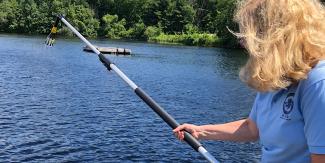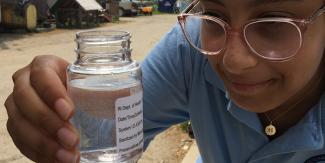RI Water Testing Program
Know your source.
The RI Produce Safety Program is offering free agricultural water testing to those farms interested in learning more about their water quality. Our program staff will assist in sample collection, drop off the samples for analysis and deliver your results, providing technical assistance along the way. Our goal is to empower growers with the knowledge and tools to proactively manage agricultural water quality, both in the field and during post-harvest activities. Safe water helps grow safe, quality produce.
What we offer.
RI DEM Division of Agriculture will cover the cost of two water tests per water source on your farm. Water sources include both groundwater (wells) and surface water (ponds). All water samples will be tested for levels of generic E. Coli. Water samples are brought to the RI Department of Health lab for analysis. Our program will receive lab results and pass them on to you, along with any recommendations.
We will come to you.
Our field staff are available to provide on-farm technical assistance including:
- Water sample collection
- Environmental risk assessment
- Water result analysis
- GAP/PSR Compliance
Schedule a test.
Water testing is now being scheduled for the 2024 season. Testing appointments will be offered on Tuesdays and Thursdays from June 4 to October 24, 2024.
Schedule a Water Testing Appointment
Frequently Asked Questions
What if my well test comes back high for generic E. coli?
Visit URI's page for Safe Well Water Tip Sheets to find recommended well water treatment options.
Where can I test my water?
Farms covered under FSMA’s Produce Safety Rule are required to test their agricultural water and send the samples to a certified laboratory that utilizes testing methods approved by FDA. Since these samples are time-sensitive, NECAFS has provided a Northeast regional map for farmers to find the closest laboratory to their location. To learn more, or to request free testing be done on your farm’s water sources, please contact one of our Produce Safety Team members.
To find RI DOH laboratories, as well as some of the services they offer, visit the Certified Analytical Laboratories webpage.
For information on drinking water quality, please visit the Center for Drinking Water Quality website.
What are the Agricultural Water Requirements for RI GAP/PSR Compliance?
The FDA Food Safety Modernization Act (FSMA) Produce Safety Rule established requirements for agricultural water used on covered farms that grow, harvest, pack, or hold produce. For pre-harvest agricultural water, the FDA published a final rule which requires systems-based, pre-harvest agricultural water assessments for hazard identification and risk management decision-making purposes. These assessments are used to identify conditions that are reasonably likely to introduce known or reasonably foreseeable hazards into or onto produce or food contact surfaces, and to determine whether, and how soon, corrective or mitigation measures must be implemented to minimize risks associated with pre-harvest agricultural water. To help farms understand the requirements for an agricultural water assessment on your farm, FDA has developed an Agricultural Water Assessment Builder. Farm’s information entered into the builder will not be shared with FDA or saved. Requirements for harvest and post-harvest uses of agricultural water, and the agricultural water requirements for sprouts, have not changed. These requirements may be partially met by participating in our free water testing program.
| Large farms | 9 months after effective date | April 7, 2025 |
| Small farms | 1 year, 9 months after effective date | April 6, 2026 |
| Very small farms | 2 years, 9 months after effective date | April 5, 2027 |
Additional Resources
- Equivalent Testing Methodology for Agricultural Water (FDA)
- Water Quality Profile Calculator (University of Arizona)
Technical Assistance
Funding was made possible, in part, by the Food and Drug Administration through grant PAR-16-137. The views expressed herein do not necessarily reflect the official policies of the Department of Health and Human Services; nor does any mention of trade names, commercial practices, or organization imply endorsement by the United States Government.


